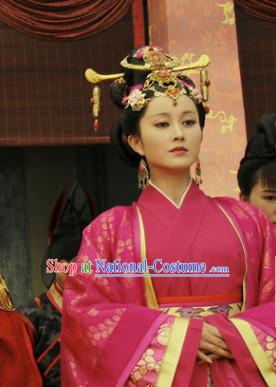
Delivery: Free 3-7 days worldwide deliveryHandicdraft: Handmade by the top traditional craftsmen
 Listen in the gallery Listen in the gallery
Rich Artistic Connotation & Historical Background:
Royal hair accessories in ancient China are precious gems in the treasure house of Chinese culture, carrying rich historical and cultural significance.
These accessories not only have practical functions such as fixing hairstyles and protecting the head from injury, but also have symbolic meanings representing imperial power, status, and identity.
The design and production techniques of these accessories were exquisite in ancient China, reflecting the artistic level and aesthetic concepts of that time.
In ancient China, there were various types of hair accessories, including crowns, buns, and hairpins.
Among them, the crown is the most representative accessory, usually made of metals such as gold, silver, and copper.
The shape and decoration of the crown vary, with round, square, hexagonal shapes, and adorned with precious materials such as gemstones, pearls, and jade.
The color of the crown is also diverse, such as red, gold, blue, etc.
, to showcase the noble status of the emperor.
In addition to the crown, ancient Chinese hair accessories also include buns and hairpins.
A bun is a hairstyle that bundles hair into a high knot, typically worn for formal occasions.
The shape and decoration of the bun vary by dynasty and region, but all reflect the aesthetic concepts and fashion trends of that time.
Hairpins are accessories that secure hair on top of the head, usually made of metals like gold, silver, or copper.
The shape and decoration of hairpins are also unique, some are curved, some are straight, some are spiraled, etc.
Ancient Chinese hair accessories not only have practicality but also symbolism.
For example, the emperor's crown often has dragon patterns because dragons hold sacred status in traditional Chinese culture and represent imperial power and authority.
In addition, some accessories have auspicious meanings, such as red crowns symbolizing joy and prosperity.
In conclusion, royal hair accessories in ancient China are an important part of Chinese culture, carrying rich historical and cultural significance.
By studying these accessories, we can better understand ancient Chinese history, art, and aesthetic concepts.
|